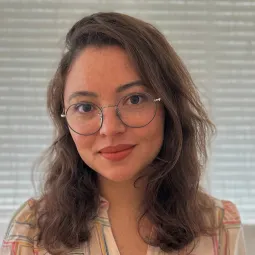
Jéssica M. Andrade Tolentino is a Brazilian children’s literature researcher and PhD student at the Australian National University. Her research focuses on the entanglements between childhood, Latin American literature, and the publishing industry. She is currently a lecturer at Pontifícia Universidade Católica de Minas Gerais (Brazil), where she teaches a course on picturebooks.
Colectivo La Lucila
Colectivo La Lucila is an interdisciplinary organisation of researchers dedicated to diversifying the perspectives on children's literature and media studies in Latin America. Its current members are Camila Andonaegui, Angela Melo, and Jéssica Tolentino. They are Erasmus Mundus Scholarship awardees and alumni of the CLMC programme’s first cohort. Through Colectivo La Lucila's social media, they have been reviewing literary and theoretical works, proposing discussions on contemporary issues, and hosting online events.
Within and beyond academia: ecology of knowledges for teaching children’s literature
In this presentation, we will explore the diverse landscapes of knowledge surrounding the teaching of children’s literature, both within and beyond traditional academic settings. Drawing upon Visvanathan's (2009) reflections on cognitive (in)justice and the ecology of knowledges, we will examine how integrating different epistemologies can contribute to fostering a positive culture of reading among students.
Through our discussion, we seek to explore the interconnectedness of various forms of knowledge, considering the specific nature of children's literature scholarship in Latin America. This includes the role of scholarly research, pedagogical perspectives, and various marginal practices in shaping effective approaches to teaching children's literature. Central to our discussion is the experience of the "Diálogos Improbables" (Improbable Dialogues) reading club promoted by Colectivo La Lucila, where literary and theoretical texts are discussed. By engaging with diverse voices and viewpoints, "Diálogos Improbables" cultivates a holistic approach, building bridges between theories and artistic expressions. We will delve into the ways in which this initiative has contributed to challenging conventional associations between types of text and types of reading practices (e.g., theoretical texts associated with analytical reading, and literary texts linked to reading for pleasure).
Recognising the intersectionality of academic and non-academic knowledge in promoting reading enjoyment allows us to bridge the gap between theory and practice, fostering environments where students are motivated to explore literature both inside and outside the classroom.